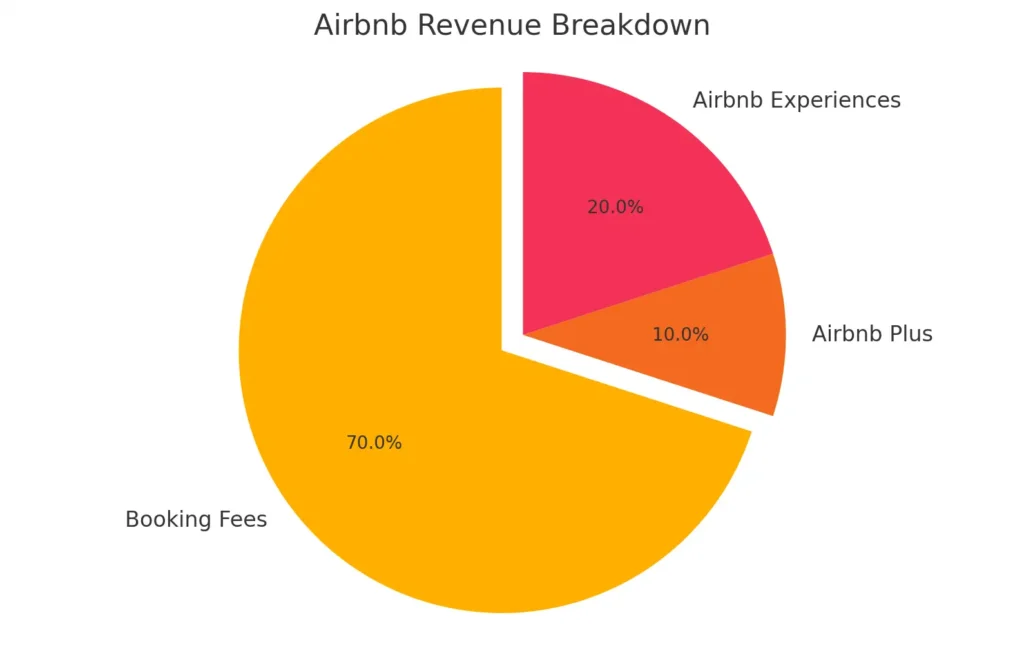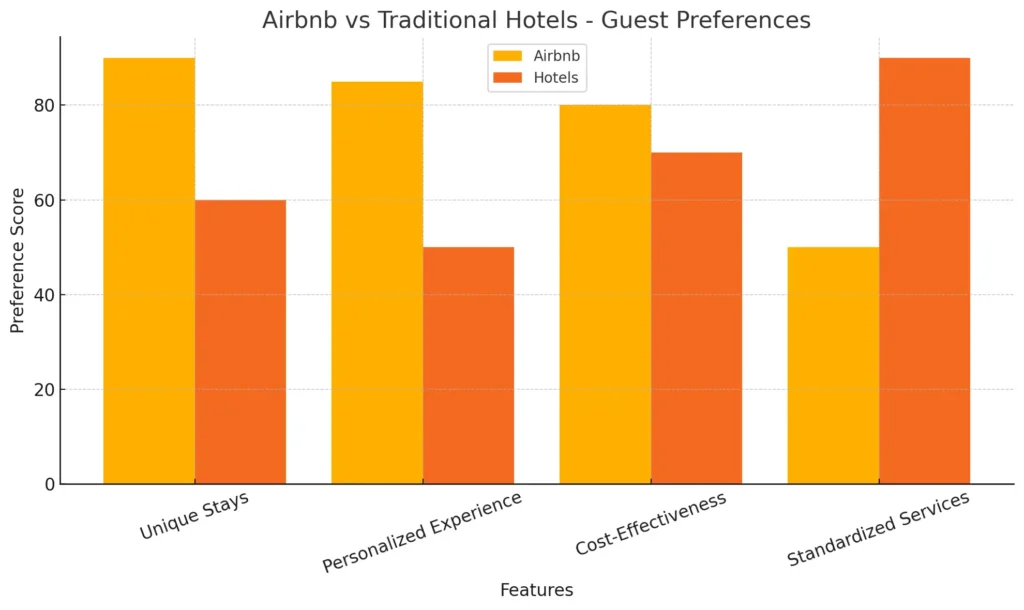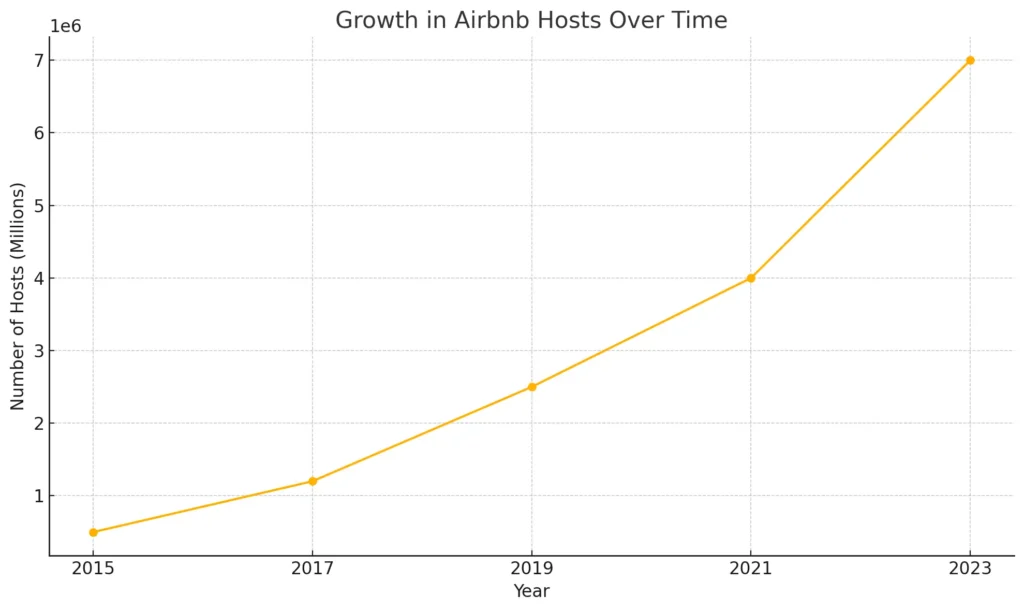The Airbnb business model has revolutionized the way travelers find accommodations and how property owners can earn extra income. By leveraging a unique online marketplace, Airbnb connects hosts with guests, creating a win-win situation for both parties. This article will explore the intricacies of Airbnb’s business model, including how it generates revenue, the challenges it faces, and its future in the travel industry.
What is the Airbnb Business Model?
How does the Airbnb business model function?
The Airbnb business model functions as an online marketplace that facilitates short-term rental bookings between hosts and travelers. By providing a platform for property owners to list their accommodations, Airbnb allows guests to browse various options, from cozy apartments to luxurious villas. This model thrives on user-generated content, where hosts showcase their spaces through detailed listings and photos, while travelers can read reviews and ratings to make informed decisions. The ease of booking and the variety of options available make Airbnb a preferred choice for many, effectively disrupting the traditional hotel industry.
Additionally, the Airbnb business model operates on a commission-based revenue system, where Airbnb takes a percentage from both hosts and guests during each transaction. This structure incentivizes Airbnb to maintain a user-friendly platform and enhance the overall experience for both parties. As the marketplace grows, so does the number of listings and travelers, creating a robust ecosystem that benefits all stakeholders involved. The seamless connection between hosts and guests is pivotal to the success of the Airbnb business model.
For businesses interested in replicating Airbnb’s success, exploring an Airbnb Clone Solution can provide a customizable and scalable platform tailored to your needs.
What are the key components of the Airbnb business model canvas?
The key components of the Airbnb business model canvas include value propositions, customer segments, channels, and revenue streams. Firstly, the value proposition lies in offering unique and diverse accommodations, often at competitive prices compared to traditional hotels. This attracts a wide range of customer segments, including leisure travelers, business travelers, and families seeking vacation rentals. Secondly, Airbnb utilizes various channels to reach its audience, such as social media, search engines, and partnerships with travel agencies, enhancing its visibility in the market.
According to PwC’s insights on the growth of the sharing economy, the sector is expected to grow significantly, creating more opportunities for platforms like Airbnb.
Moreover, the Airbnb revenue model is built on multiple revenue streams, including service fees charged to guests and hosts, as well as additional offerings like Airbnb Experiences, which provide travelers with local activities and tours. Understanding these components allows stakeholders to grasp how Airbnb operates effectively and how it continues to grow within the travel and hospitality sectors. Overall, the Airbnb business model canvas illustrates the interconnectedness of various elements that contribute to its success.
How does Airbnb connect travelers to hosts?
Airbnb connects travelers to hosts through its user-friendly platform, which allows guests to search for accommodations based on their specific needs and preferences. When travelers enter their desired location, dates, and other filters, the Airbnb platform generates a list of available listings, showcasing photos, descriptions, and reviews from previous guests. This transparency fosters trust and enables travelers to make informed decisions about their booking. The platform also allows for direct communication between hosts and guests, facilitating questions and clarifications before finalizing the reservation.
Furthermore, Airbnb employs sophisticated algorithms that personalize search results based on user behavior and preferences, ensuring that travelers receive tailored recommendations. This connection extends beyond just accommodation; Airbnb also provides insights into local attractions, dining options, and unique experiences that can enhance a traveler’s stay. By bridging the gap between hosts and guests, Airbnb creates a comprehensive travel experience that goes beyond mere lodging, making it a prominent player in the hospitality industry.
Read More “Top Vacation Rental Apps Like Airbnb in the USA: Discover the Best Alternatives“
How Does Airbnb Make Money?
What are the main revenue streams for Airbnb?
Airbnb generates revenue through multiple streams that contribute to its overall business sustainability. The primary revenue stream comes from service fees charged to both guests and hosts during the booking process. Guests typically pay a service fee that ranges from 5% to 15% of the booking subtotal, while hosts are charged a standard 3% fee on each reservation. This dual revenue model allows Airbnb to maintain a profitable operation while also providing value to its users.
Airbnb Revenue Streams
| Revenue Stream | Description | Percentage of Total Revenue |
|---|---|---|
| Booking Fees | Fees from guests and hosts for every booking. | 70% |
| Airbnb Plus | Premium, verified listings for high-end travelers. | 10% |
| Airbnb Experiences | Activities, tours, and workshops hosted by locals. | 20% |
Additionally, Airbnb offers various premium services, such as Airbnb Plus, which features high-quality listings verified for quality and comfort. These services often come with additional fees, further enhancing the revenue potential for the company. Another emerging revenue stream is Airbnb Experiences, which allows hosts to offer unique activities, tours, and workshops to travelers, thereby diversifying the company’s income sources. This multi-faceted approach to revenue generation is key to understanding how Airbnb makes money in the competitive travel industry.
How does Airbnb charge service fees?
Airbnb charges service fees to both hosts and guests as a fundamental part of its revenue model. For guests, the service fee is calculated as a percentage of the booking subtotal, which includes the nightly rate, cleaning fees, and any additional charges. This fee typically ranges from 5% to 15%, depending on the total amount and the specifics of the booking. This structure ensures that guests are aware of the total cost upfront, promoting transparency in the booking process.
On the host side, Airbnb charges a standard service fee of around 3% for every reservation made through its platform. This fee is taken from the host’s payout and is crucial for maintaining the platform’s operations, including customer support and development of new features. By clearly outlining these service fees, Airbnb ensures that hosts and guests are aware of the costs associated with using the platform, allowing for a smoother and more transparent booking experience. This approach not only supports Airbnb’s revenue model but also reinforces trust among its users.
What role do property owners play in the Airbnb revenue model?
Property owners play a pivotal role in the Airbnb revenue model, serving as hosts who provide listings for travelers seeking accommodations. Without the participation of property owners, Airbnb would struggle to offer the extensive variety of listings that attract millions of travelers worldwide. These hosts create unique experiences by sharing their homes, apartments, or vacation rentals, which enhances the overall appeal of the Airbnb platform. Their involvement directly influences the quality and availability of accommodations, making them essential to the business model’s success.

Moreover, property owners benefit from this arrangement by earning additional income from their unused spaces. Many hosts use Airbnb as a way to supplement their primary income or to offset the costs of mortgage payments and maintenance. This symbiotic relationship between Airbnb and property owners is crucial; as hosts gain financial benefits, Airbnb expands its inventory of listings, ultimately attracting more travelers. The collaborative nature of this relationship illustrates how integral property owners are to the overall Airbnb revenue model, making them key players in the platform’s ongoing success.
Ready to make your Airbnb rental a profitable success?
With expert listing optimization, seamless guest management,
and smart strategies, your rental income is within reach.
What are the Key Problems and Solutions of the Airbnb Business Model?
What challenges do hosts on Airbnb face?
Hosts on Airbnb encounter several challenges that can affect their ability to successfully manage their listings and provide a positive experience for guests. One major challenge is the competition among numerous listings in popular destinations, which can make it difficult for individual hosts to stand out. This saturation often leads to lower occupancy rates and pressure to lower prices, affecting the overall profitability for hosts. Additionally, hosts must navigate the complexities of local regulations and zoning laws, which can vary significantly from one location to another.
Another common issue is maintaining the quality and cleanliness of the property, as guests expect a high standard of accommodation. Hosts must invest time and resources into ensuring that their properties meet these expectations to avoid negative reviews and potential penalties from Airbnb. To address these challenges, many hosts turn to professional cleaning services and property management tools to streamline operations and enhance guest satisfaction. By proactively addressing these issues, hosts can improve their chances of success in the competitive Airbnb marketplace.
This article is based on publicly available information and expert analysis.
How does Airbnb address issues related to accommodation quality?
Airbnb has implemented various measures to address issues related to accommodation quality and ensure a consistent experience for travelers. One notable initiative is the Airbnb Plus program, which features listings that have been verified for quality, design, and amenities. Hosts who qualify for this program must meet specific criteria and undergo a thorough verification process, providing guests with greater confidence in the quality of their accommodations. This initiative not only enhances the guest experience but also encourages hosts to maintain high standards for their properties.
Additionally, Airbnb provides hosts with resources and guidelines to help them improve their listings, such as tips on effective communication, pricing strategies, and property maintenance. The platform also encourages guests to leave reviews and ratings, which can help highlight quality issues and prompt necessary improvements. By fostering an environment of accountability and support, Airbnb actively works to enhance accommodation quality across its marketplace, ultimately benefiting both hosts and guests.
What are the potential risks for property owners?
Property owners who list their accommodations on Airbnb face several potential risks that could impact their investment and overall experience. One significant risk is the possibility of property damage caused by guests, which can lead to costly repairs and maintenance. While Airbnb offers a host guarantee program to cover certain damages, there are limitations and conditions that may not fully protect property owners. This uncertainty can deter some potential hosts from participating in the platform.
Moreover, property owners must also navigate the challenges of guest behavior, such as noise complaints or violations of house rules. These situations can lead to disputes, negative reviews, and potential penalties from Airbnb, which could harm a host’s reputation and future bookings. To mitigate these risks, many property owners opt for comprehensive insurance policies and implement clear house rules to set expectations for guests. By being proactive and prepared for potential challenges, property owners can better safeguard their investments while enjoying the benefits of the Airbnb platform.
How Does Airbnb Operate in the Market?
What is the cost structure of Airbnb?
The cost structure of Airbnb is essential to understanding how the platform operates effectively in the competitive travel and hospitality market. Primarily, Airbnb’s costs are associated with technology development, customer support, and marketing efforts aimed at attracting both hosts and guests. As a technology-driven company, Airbnb invests heavily in app development and platform enhancements to ensure a seamless user experience, which is vital for maintaining customer loyalty and attracting new users.
Additionally, the company incurs operational costs related to managing the vast network of listings and ensuring compliance with local regulations. Marketing expenses are also significant, as Airbnb seeks to differentiate itself from traditional hotels and other short-term rental platforms. By balancing these costs against its revenue streams, primarily derived from service fees, Airbnb can maintain profitability while continuously improving its offerings. This strategic approach to cost management is crucial for sustaining growth and competitiveness in the evolving travel industry.
How does the Airbnb platform work compared to traditional hotels?
The Airbnb platform operates fundamentally differently from traditional hotels, primarily in its approach to accommodation and guest experience. Unlike hotels, which provide standardized services and amenities, Airbnb offers a diverse range of unique properties that cater to various tastes and budgets. This allows travelers to choose accommodations that align with their preferences, whether it’s a cozy cabin, a modern apartment, or a luxurious villa. As a result, guests often seek out Airbnb listings for the personalized and authentic experiences they offer.
Airbnb Business Model vs. Traditional Hotels
| Aspect | Airbnb | Traditional Hotels |
|---|---|---|
| Accommodation Types | Homes, apartments, villas, unique stays | Standardized hotel rooms |
| Revenue Model | Peer-to-peer, commission-based | Direct booking, room charges |
| Guest Experience | Personalized, local insights | Standardized hospitality services |
Furthermore, the booking process on Airbnb is typically more flexible than traditional hotel reservations, allowing guests to connect directly with hosts and negotiate terms if necessary. The platform also fosters a sense of community by encouraging hosts to share local insights and recommendations with their guests, enhancing the travel experience. This emphasis on personal connection and unique offerings sets Airbnb apart from conventional hotels, making it a popular choice among travelers seeking alternatives to traditional lodging options.

What makes Airbnb a preferred option for business travel?
Airbnb has emerged as a preferred option for business travel due to its unique offerings and flexibility compared to traditional hotel accommodations. Business travelers often appreciate the variety of listings available, which can include full apartments or houses that provide more space and amenities than a typical hotel room. This is particularly advantageous for those on extended stays or traveling with colleagues, as it allows for a more home-like environment conducive to work and relaxation.
Additionally, the Airbnb for Work program caters specifically to business travelers, offering tools and resources for booking corporate travel. This program allows companies to manage travel arrangements efficiently and provides employees with access to unique accommodations that meet their needs. Moreover, Airbnb’s competitive pricing often results in cost savings for companies compared to standard hotel rates, making it an attractive option for budget-conscious businesses. Overall, the combination of flexibility, unique offerings, and cost-effectiveness positions Airbnb as a favored choice for business travel in today’s dynamic work environment.
The Importance of App Development in Airbnb’s Success
App development has been a cornerstone of Airbnb’s journey from a startup to a global leader in the hospitality industry. The seamless functionality of the Airbnb app plays a crucial role in how Airbnb works, connecting travelers with hosts effortlessly. By focusing on intuitive design and user-centric features, Airbnb has created a platform that simplifies listing on Airbnb, booking stays, and managing transactions.
The app’s robust infrastructure ensures scalability, allowing Airbnb to handle millions of users globally while maintaining a high level of reliability. Features like secure payment systems, instant communication between hosts and travelers, and curated recommendations have made the app indispensable for its users. Airbnb pays close attention to integrating innovative technologies, such as AI-driven personalization, which enhances the overall user experience.
Moreover, Airbnb’s app development strategy has allowed it to adapt quickly to market demands. For instance, the introduction of premium features like Airbnb Plus and tailored search filters demonstrates how Airbnb focuses on meeting diverse traveler preferences. In a competitive landscape, the app’s efficiency and adaptability have been critical in helping Airbnb maintain its edge and redefine how the hospitality industry operates. The success of the app showcases the power of tech-driven solutions in scaling a business and delivering exceptional user experiences.
Developing a user-friendly and robust application is crucial. Miracuves Custom Mobile App Development services ensure your platform meets industry standards and user expectations.
Breaking Down the Airbnb Cost Structure
The Airbnb business model works by leveraging a peer-to-peer platform that connects travelers with hosts offering unique stays worldwide. Since Airbnb launched in 2008, it has redefined the hospitality industry by enabling listing on Airbnb, empowering hosts, and simplifying travel for millions.
Airbnb charges a service fee from both travelers and hosts, ensuring smooth operations while Airbnb pays close attention to maintaining a trustworthy platform. Airbnb focuses on enhancing user experience through features like curated stays and premium options such as Airbnb Plus. Over the years, Airbnb has also expanded its offerings, helping it compete with Airbnb alternatives while maintaining its market leadership.
Airbnb has faced challenges, including regulatory hurdles and market competition, but Airbnb has set an example of resilience and adaptability. By understanding the Airbnb cost structure and operational strategies, businesses can gain valuable insights. Whether you’re a traveler or a host, the Airbnb story demonstrates how a visionary business model can create meaningful connections and lasting experiences.
What is the Future of Airbnb?
How is Airbnb adapting to changes in the travel industry?
Airbnb is continuously adapting to changes in the travel industry to maintain its relevance and competitive edge. One significant adaptation is the focus on enhancing guest safety and security, especially in light of the COVID-19 pandemic. Airbnb has implemented rigorous cleaning protocols and introduced features such as flexible cancellation policies to address travelers’ concerns, ensuring that guests feel comfortable booking accommodations on the platform.

Moreover, Airbnb is also diversifying its offerings by expanding into new markets and introducing initiatives like Airbnb Experiences, which allows travelers to participate in local activities and cultural experiences. This diversification not only enriches the travel experience but also provides additional revenue streams for the company. By staying attuned to industry trends and evolving consumer preferences, Airbnb is positioning itself to thrive in a rapidly changing landscape, ensuring its continued success in the travel sector.
To learn more about Airbnb’s ongoing initiatives and updates, check out Airbnb’s official updates and innovations.
What innovations are expected in the Airbnb app?
Innovations in the Airbnb app are crucial for enhancing user experience and maintaining competitiveness in the travel industry. One expected innovation is the integration of advanced artificial intelligence (AI) features that can provide personalized recommendations based on user preferences and past bookings. This could streamline the search process for travelers, making it easier for them to find suitable listings that match their needs.
Additionally, the app may incorporate features that facilitate seamless communication between hosts and guests, allowing for real-time updates and easier resolution of issues. Enhanced mapping capabilities could also be developed, providing travelers with better insights into nearby attractions, dining options, and transportation. As the Airbnb app continues to evolve, these innovations aim to enrich the overall user experience, reinforcing Airbnb’s position as a leader in the online marketplace for travel accommodations.
How might Airbnb expand its business plan?
Airbnb may expand its business plan by exploring new markets and diversifying its offerings beyond traditional accommodations. One potential avenue for growth is increasing its presence in emerging markets, where demand for short-term rentals is on the rise. By tailoring its marketing strategies and listings to cater to local preferences and cultural nuances, Airbnb can tap into untapped customer segments.
Furthermore, Airbnb could enhance its focus on corporate travel by developing partnerships with businesses and offering exclusive deals for companies utilizing its platform for employee travel. This could include tailored packages that include both accommodations and Airbnb Experiences, creating a comprehensive travel solution for business clients. By continually innovating and adjusting its business plan, Airbnb can remain agile and responsive to changes in consumer behavior and market dynamics, ensuring its growth and sustainability in the long term.
Are There Alternatives to Airbnb?
What are some platforms like Airbnb?
Several platforms like Airbnb have emerged in the market, catering to travelers seeking short-term rentals and unique accommodations. Some notable alternatives include Vrbo, which focuses primarily on vacation rentals, and HomeAway, which offers a similar service with a strong emphasis on family-friendly properties. These platforms cater to specific niches, allowing travelers to find accommodations that suit their needs.
Additionally, Booking.com has expanded its offerings to include vacation rentals alongside traditional hotel listings, providing users with a comprehensive booking experience. Other platforms, such as FlipKey and Tujia, are also gaining traction in specific markets, further diversifying the options available for travelers. As competition increases, these alternative platforms challenge Airbnb’s dominance in the short-term rental space, offering travelers more choices when it comes to accommodations.
For entrepreneurs looking to enter the market with a proven model, Miracuves Clone Solutions Development offers a strategic approach to launching your platform efficiently.
How do alternatives compare to the Airbnb business model?
Alternatives to Airbnb often present varying business models and approaches to short-term rentals, which can influence user experience and market positioning. While Airbnb operates on a commission-based revenue model, charging service fees to both hosts and guests, some alternatives may implement different fee structures, impacting their overall attractiveness to users. For instance, platforms like Vrbo typically focus on whole-home rentals and may charge hosts a flat listing fee, appealing to different segments of the market.
Moreover, the user experience can differ significantly among these platforms. Airbnb is known for its community-oriented approach, encouraging hosts and guests to engage and share local insights, while other platforms may focus more on transactional relationships. These differences can shape traveler preferences and influence their choice of platform when booking accommodations, showcasing the diverse landscape of the short-term rental market.
What unique offerings do competitors provide?
Competitors of Airbnb provide unique offerings that cater to specific traveler preferences and needs, setting them apart in the crowded short-term rental market. For instance, Vrbo focuses primarily on family-friendly vacation rentals, often featuring larger properties that accommodate groups, making it an attractive option for family vacations. This specialization allows Vrbo to carve out a niche within the broader short-term rental landscape.
Similarly, platforms like Tujia cater specifically to the Chinese market, offering listings that appeal to local travelers and incorporating cultural elements into the booking experience. Other competitors, such as FlipKey, emphasize curated lists of top-rated properties, ensuring that travelers can easily find high-quality accommodations. By offering unique services, features, or target markets, these competitors challenge Airbnb’s position and provide travelers with additional choices when seeking short-term rentals.
Conclusion
The business model of Airbnb is a remarkable example of how a peer-to-peer model can thrive without owning a single property. Since Airbnb was founded in 2008, the launch of Airbnb revolutionized the hospitality industry by enabling Airbnb hosts to list their properties on the Airbnb website. The Airbnb business model works by charging both hosts and guests on Airbnb a service fee. Specifically, Airbnb charges hosts a percentage of their earnings while Airbnb charges guests a service fee for each booking. The model of Airbnb ensures seamless transactions as Airbnb handles the booking process.
Over the years, Airbnb has made significant advancements, such as Airbnb plus listings, catering to premium travelers. Despite stiff competition, the Airbnb brand has set a benchmark in the sharing economy, demonstrating how Airbnb earns revenue through its robust Airbnb cost structure. By focusing on the business needs of both travelers and hosts, Airbnb introduced innovative solutions that have enhanced user experience. The business idea of creating a global platform that Airbnb employs various strategies to sustain remains pivotal.
For a deeper dive into Airbnb’s innovative strategies and market impact, explore Harvard Business Review’s analysis of Airbnb’s strategies.
Today, Airbnb has reached millions of users globally, proving its resilience even as Airbnb faces stiff competition. Unlike Airbnb, traditional models struggle to offer the flexibility and insights that the Airbnb business plan provides, providing valuable insights for future guests.
Have questions about scaling your rental property business?
Let’s Talk About Your Rental Property
Business Growth ! Our industry experts
are here to guide you.
FAQs
What is Airbnb’s primary source of revenue?
Airbnb earns most of its revenue from service fees charged to both guests (5–15%) and hosts (3%) per booking.
How does Airbnb Plus contribute to Airbnb’s revenue?
Airbnb Plus includes premium listings that meet high-quality standards, allowing Airbnb to charge higher fees and attract luxury travelers.
Does Airbnb make money from Experiences?
Yes, Airbnb earns a commission from Airbnb Experiences, which are activities or tours hosted by locals.
What is the biggest challenge for Airbnb hosts?
Regulatory compliance is a major challenge, as local laws on short-term rentals vary widely.
How do hosts handle property damage?
Airbnb offers a Host Guarantee program to cover certain damages, but hosts often supplement this with private insurance.
What steps can hosts take to stand out among competitors?
Hosts can improve their listings with professional photos, competitive pricing, and excellent guest reviews.
Check out our popular rental app solutions offered by Miracuves – built for versatility, performance, and scale:
- Airbnb Style Platform – A powerful platform like rental app for booking stays, ordering food, hailing rides, making payments and more.
- Zillow Style Platform – A powerful property listing solution inspired by Zillow, offering advanced search filters, map-based browsing, and real-time updates for buyers, sellers, and renters.
- Blueground Style Platform– An inspired platform like Blueground for booking fully furnished, long-term rentals through an easy-to-use app built for modern.
- Buildium Style Platform – An all-in-one app like Buildium for property managers and landlords to handle rentals, payments, maintenance and more.
- Dream Yacht Charter Style Platform – A platform like yacht booking we have Dream Yacht Charter that lets users easily reserve bareboat or crewed charters.








